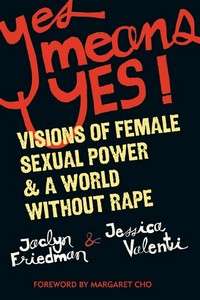Yes Means Yes
 | |
| Author | Jaclyn Friedman and Jessica Valenti |
|---|---|
| Country | United States |
| Language | English |
| Subject | Feminism |
| Published | 2008 Perseus Books Group (Seal Press) |
| Pages | 351 |
| ISBN | 978-1-58005-257-3 |
| OCLC | 227574524 |
Yes Means Yes: Visions of Female Sexual Power and A World Without Rape is a feminist-themed book by Jaclyn Friedman and Jessica Valenti published in 2008. The book was one of the 99 Publishers Weekly's Best Books of 2009[1] and has inspired a sex education non-credit course at Colgate University.[2]
The book consists of a series of 27 essays by various authors which all share the central theme of preventing rape by addressing the cultural and societal milieu that the authors say is complicit in enabling rape. The title is a reference to the popular "No Means No" campaign against date rape. Contributors to the anthology include Rachel Kramer Bussel, Leah Lakshmi Piepzna-Samarasinha, Stacey May Fowles, Coco Fusco, Lisa Jervis, Heather Corinna, Julia Serano, Hanne Blank, and Margaret Cho.
Colgate is committed to improving the sexual climate on campus, providing numerous programs to promote healthy sexuality. [3] Not only do they offer a course on Yes Means Yes: Visions of Female Sexual Power and A World Without Rape, they have a committee as well. This committee is called The Sexual Climate Advisory Committee. [3] This committee is composed of faculty, staff, and students.[3] It is charged with developing and evaluating initiatives at the individual, environmental, and system level that contribute to a climate of sexual respect. [3]Scott Brown, who is the dean of students, leads monthly meetings. [3]
From the slogan, "No Means No", colleges are abandoning the old slogan and accepting "Yes Means Yes" to promote more positivity. “The swiftly evolving conversation about defining sexual assault signaled to us that we needed to reframe our name as something more positive... and it’s even possible that ‘No means no’ will be an outdated or irrelevant concept in 10 years. Students may not have even heard of the phrase by then", said by Allison Korman, the group’s executive director.[4] Now, there are more than eight hundred colleges and universities that have adopted an affirmative consent definition in their sexual assault policies.[4]
The book's influence caused California to enact a law, seeking both to improve how universities handle rape and sexual assault accusations and to clarify the standards, requiring an "affirmative consent" and stating that consent can’t be given if someone is asleep or incapacitated by drugs or alcohol. The governor of California states, “The State of California will not allow schools to sweep rape cases under the rug. We’ve shifted the conversation regarding sexual assault to one of prevention, justice and healing.” Students should feel safe and healthy and enacting this law will help students to feel this way. [5]
In California, if a student does not give an enthusiastic "yes", either verbally or physically, then the sexual act has no consent. If the student is under the influence, there is also no consent. California has influenced other states to define consent laws. New Hampshire and New Jersey have introduced bills to further define their states' consent laws in colleges. New York's state legislation has adopted the same definition as California's consent law at all of its sixty-four campuses. Every Ivy League institution, except Harvard University, has adopted some affirmative consent definition.[4]
References
- ↑ "Best Books of 2009". Publishers Weekly. November 2, 2009.
- ↑ Cattano, Kelly (October 8, 2009). "KISC Creates Hook-Up Convos". The Colgate-Maroon News. Archived from the original on December 11, 2009.
- 1 2 3 4 5 "Sexual Climate Initiatives". colgate.edu.
- 1 2 3 "More college campuses swap 'No means no' for 'Yes means yes'". PBS NewsHour.
- ↑ "California Enacts 'Yes Means Yes' Law, Defining Sexual Consent". NPR.org. 29 September 2014.